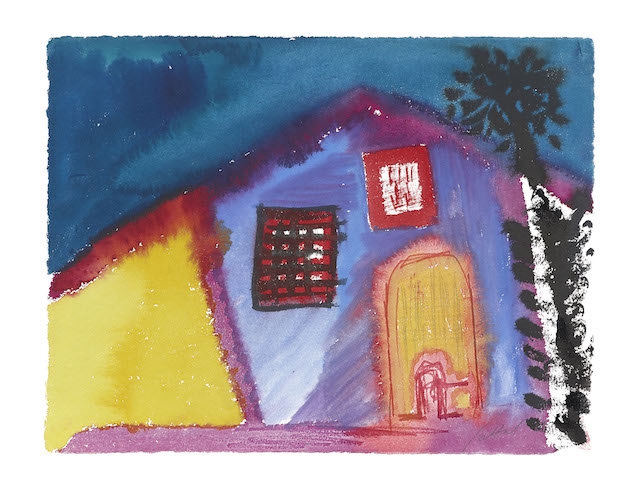You’d be mistaken in thinking Simone Fattal’s watercolours were simple. In their uninhibited style, vivid colour and joyous mood, the Lebanese artist’s paintings are – superficially at least – reminiscent of a child’s daubs. My House (2015) even recalls the famous House-Tree-Person drawing test, often used as part of the psychological assessment of children; in Fattal’s watercolours there are no people, but there are plenty of houses and trees. Given that the ceramic sculpture for which Fattal is best known largely comprises abstracted humanoid forms, the preponderance of trees over humans in these works is particularly noticeable.
Trees appear throughout, either foregrounded as the subject or incidental. This is perhaps no surprise, given the potent symbolism that Fattal ascribes them. In conversation with curator Hans Ulrich Obrist in Heni Publishing’s accompanying book, Fattal describes what she sees as the almost apotropaic role of trees in her homeland: ‘The trees, they are what protect the house, protect cities. For instance, Damascus is protected by the gardens surrounding it… With the destruction of these gardens evil comes.’ Viewed in this context, her apparently glib watercolours bear a serious undercurrent. They are a paean to trees as a charm against devastation – coming from an artist who, in 1980, was driven from Beirut by the outbreak of civil war. Early pastel drawings of trees that prefigured Fattal’s current paintings were lost during the conflict.
Like trees, fruit also appears throughout Fattal’s work. Paradise, as described in the Quran, is a garden filled with trees and fruit; in the accompanying book, she remembers her grandfather’s ‘real Arabic house’, with its courtyard filled with fruit trees, as being built on a paradisiacal model. She cites the importance of memories to her painting – in particular memories of her childhood in Damascus, which she describes as a ‘lost paradise’. Whether pictured while growing, as in The dates (2014), or as still lifes in bowls, fruit is depicted with an innocent, almost prelapsarian pleasure. Some are painted so loosely as to approach abstraction, whereas others are more naturalistic. Fattal, who studied philosophy in Paris and Beirut, describes these watercolours as being ‘like phenomenology – to understand what it is about’. Nevertheless, what predominates over any intellectualising is a Matisse-like delight in beauty; the reference also rings true in the occasional collage of cutout paper. The formative influence of European modernist painting is clear throughout. The palette echoes that of Fattal’s partner and fellow artist, Etel Adnan, and she cites Paul Klee as an important influence, but the combination of sunny tones, dabbing brushstrokes and arcadian mood are also strikingly reminiscent of Fauvism.
The only break in mood comes at the show’s end, where a small cluster of works abandon the overall sense of levity. This is clearest in Days of sorrow (2012): a blur of wet browns and rather unsubtly glued fragments of charcoal, suggestive of explosions and rubble. Despite Fattal’s obvious sincerity, their sudden, heavy-handed grimness renders them at odds with the rest of the show; these mixed-media works would perhaps be better suited to another exhibition altogether. What hits home here is the mood of optimism and warmth, which – thankfully – prevails.
Created by a war-exiled artist trained in logic and aesthetic philosophy who founded a publishing press of experimental literature, these watercolours are a vision of someone unbinding themselves from rigour – and relishing every moment. If you’re in need of some visual vitamin D to ward away greyness and cynicism, this might just be it.
Simone Fattal: Watercolours, Heni Publishing, London, 30 November – 7 January
From the January & February 2018 issue of ArtReview
